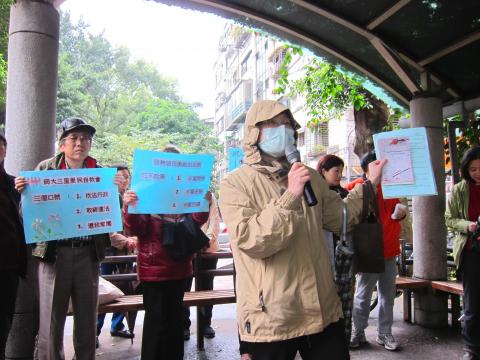Amid an ongoing dispute over the legitimacy of vendors operating in Taipei’s Shida Night Market, a local residents’ self-help association yesterday dismissed the vendors’ latest pledge to maintain a clean environment, insisting that their demand for illegal businesses to leave the neighborhood remained unchanged.
More than 400 vendors in the night market recently signed a joint pledge of self-restraint to reduce air and noise pollution, and presented the pledge to the Taipei City Government yesterday.
In the pledge, vendors promised to move closing hours to 11pm, take responsibility for cleaning up the roads and collecting garbage after closing the stores, keeping the music and their voices down and installing more facilities to prevent air pollution.

Photo: Tsai Wei-chi, Taipei Times
However, the vendors’ latest efforts to keep their businesses from being shut down amid a recent crackdown on illegal businesses in the night market did not receive a positive response from local residents.
“Those vendors have been ignoring the law by operating illegally in the area and they are in no position to sign any pledges. Our demand that illegal businesses leave the neighborhood will not change,” association director Liu Chen-wei (劉振偉) said.
Liu also dismissed the city government’s issuing of questionnaires to neighborhood residents to seek their opinion on dealing with the vendors and urged the city not to side with the vendors.
Taipei City Government spokesman Chang Chi-chiang (張其強) said the city’s goal of maintaining a safe and quiet environment for residents remained and while the vendors’ pledge to maintain a clean and quiet environment was welcomed, it would not affect the city’s plan in handling the issue.
“We will continue to demand area vendors follow the regulations, and the city government will hold more public hearings with vendors and residents. Hopefully they can reach a consensus,” Chang said.
Disputes over the night market began after Taipei Mayor Hau Lung-bin (郝龍斌) announced in November last year that expansion of the market would not be allowed following a growing number of complaints from residents about the garbage and noise produced by vendors and customers.
In addition to noise and air pollution, some vendors have also violated regulations, as their locations are classified as residential zones. According to the city’s land-use bylaws, roads less than 6m wide in residential zones cannot be used for commercial purposes.

Taiwanese can file complaints with the Tourism Administration to report travel agencies if their activities caused termination of a person’s citizenship, Mainland Affairs Council Minister Chiu Chui-cheng (邱垂正) said yesterday, after a podcaster highlighted a case in which a person’s citizenship was canceled for receiving a single-use Chinese passport to enter Russia. The council is aware of incidents in which people who signed up through Chinese travel agencies for tours of Russia were told they could obtain Russian visas and fast-track border clearance, Chiu told reporters on the sidelines of an event in Taipei. However, the travel agencies actually applied

Japanese footwear brand Onitsuka Tiger today issued a public apology and said it has suspended an employee amid allegations that the staff member discriminated against a Vietnamese customer at its Taipei 101 store. Posting on the social media platform Threads yesterday, a user said that an employee at the store said that “those shoes are very expensive” when her friend, who is a migrant worker from Vietnam, asked for assistance. The employee then ignored her until she asked again, to which she replied: "We don't have a size 37." The post had amassed nearly 26,000 likes and 916 comments as of this

New measures aimed at making Taiwan more attractive to foreign professionals came into effect this month, the National Development Council said yesterday. Among the changes, international students at Taiwanese universities would be able to work in Taiwan without a work permit in the two years after they graduate, explainer materials provided by the council said. In addition, foreign nationals who graduated from one of the world’s top 200 universities within the past five years can also apply for a two-year open work permit. Previously, those graduates would have needed to apply for a work permit using point-based criteria or have a Taiwanese company

The Shilin District Prosecutors’ Office yesterday indicted two Taiwanese and issued a wanted notice for Pete Liu (劉作虎), founder of Shenzhen-based smartphone manufacturer OnePlus Technology Co (萬普拉斯科技), for allegedly contravening the Act Governing Relations Between the People of the Taiwan Area and the Mainland Area (臺灣地區與大陸地區人民關係條例) by poaching 70 engineers in Taiwan. Liu allegedly traveled to Taiwan at the end of 2014 and met with a Taiwanese man surnamed Lin (林) to discuss establishing a mobile software research and development (R&D) team in Taiwan, prosecutors said. Without approval from the government, Lin, following Liu’s instructions, recruited more than 70 software